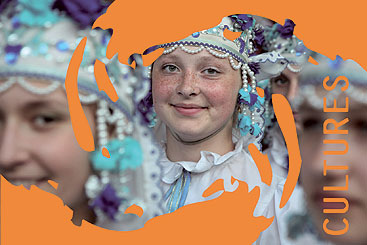
Danube Day 2007: celebrating Danube cultures
The Danube is more than water – for centuries the river has shaped the culture and lives of the people living in the basin. Danube Day 2007 celebrations will showcase the variety of cultures in the Danube River Basin.

For the fourth time, Danube Day will connect old and young residents of all the countries of the Danube Basin to celebrate the shared treasures of the region. Share your support of the Danube with friends and family with these Danube Day postcards, available from the ICPDR at www.danubeday.org
Danube Day is a powerful tool for developing the ‘Danubian identity’ of the people living in the basin by reminding them that the region is not only rich in ecological treasures, but also in cultural ones. and that gives us all the shared responsibility to protect a precious resource - the Danube rivers.
Culture and history – shaped by Danube water. The Danube is an important European river, forming borders and natural links for nature and cultures. The basin hosts diverse customs, dialects and economies. The footprints of the Habsburg and Turkish empires can still be found today and deep-rooted traditions are still very much alive. For 500 years, the Danube was the border between the Noricum province of the Roman Empire and the territory of the Germanic ‘barbarians’ tribes. Important historic events are also connected to the river, such as the epic Song of the Nibelungs from around 1200 AD or the military battle between the Habsburg emperors and Napoleon in 1809 near the Danube floodplains east of Vienna.
Today, tens of thousands of tourists travel along the Danube on bicycle or cruise ship to visit its chain of natural and cultural pearls, such as monasteries, castles, floodplain forests and the Danube Delta. A variety of cultural events take place on the Danube, such as the Donauinselfest in Vienna and the Sziget festival in Budapest, while in old riparian villages local artists exhibit their handicrafts. This riverrelated culture also exists on the large tributaries – such as the Tisza, linking the Carpathian Mountain and the Pannonian cultures, and the Sava which serves as the gateway to the Balkan region.
Time to celebrate the diversity – get involved! Danube Day 2007 will pay tribute to this diversity and focus on culture when celebrating the Danube and its tributaries. The day strengthens ‘Danubian identity’ and the knowledge that we all depend on each other. Nothing can be achieved without respect and cooperation, and it takes people from all walks of life across the basin to make a real difference. Get involved and take action to raise awareness on the Danube and its tributaries!
The Danube Art Masters Competition will be an important element of Danube Day again this year, organised jointly by the ICPDR, national ministries of water management and the Danube Environmental Forum. National contests will be carried out within each country and the national winners will be invited to a ‘Danube capital’, where the international winner will be crowned.
For more information on Danube Day 2007 or how to participate, visit www.danubeday.org or contact your national Danube Day contact person.
Disclaimer
The information contained in the ICPDR website is intended to enhance public access to information about the ICPDR and the Danube River. The information is correct to the best of the knowledge of the ICPDR Secretariat. If errors are brought to our attention we will try to correct them.
The ICPDR, expert group members, nor other parties involved in preparation of information contained on this website cannot, however, be held responsible for the correctness and validity of the data and information provided, nor accept responsibility or liability for damages or losses arising directly or indirectly from the use of the information conveyed therein.
Only those documents clearly marked ICPDR documents reflect the position of the ICPDR.
Any links to other websites are provided for your convenience only. The ICPDR does not accept any responsibility for the accuracy, availability, or appropriateness to the user's purposes, of any information or services on any other website.
When using the information and material provided on this website, credit should be given to the ICPDR.
